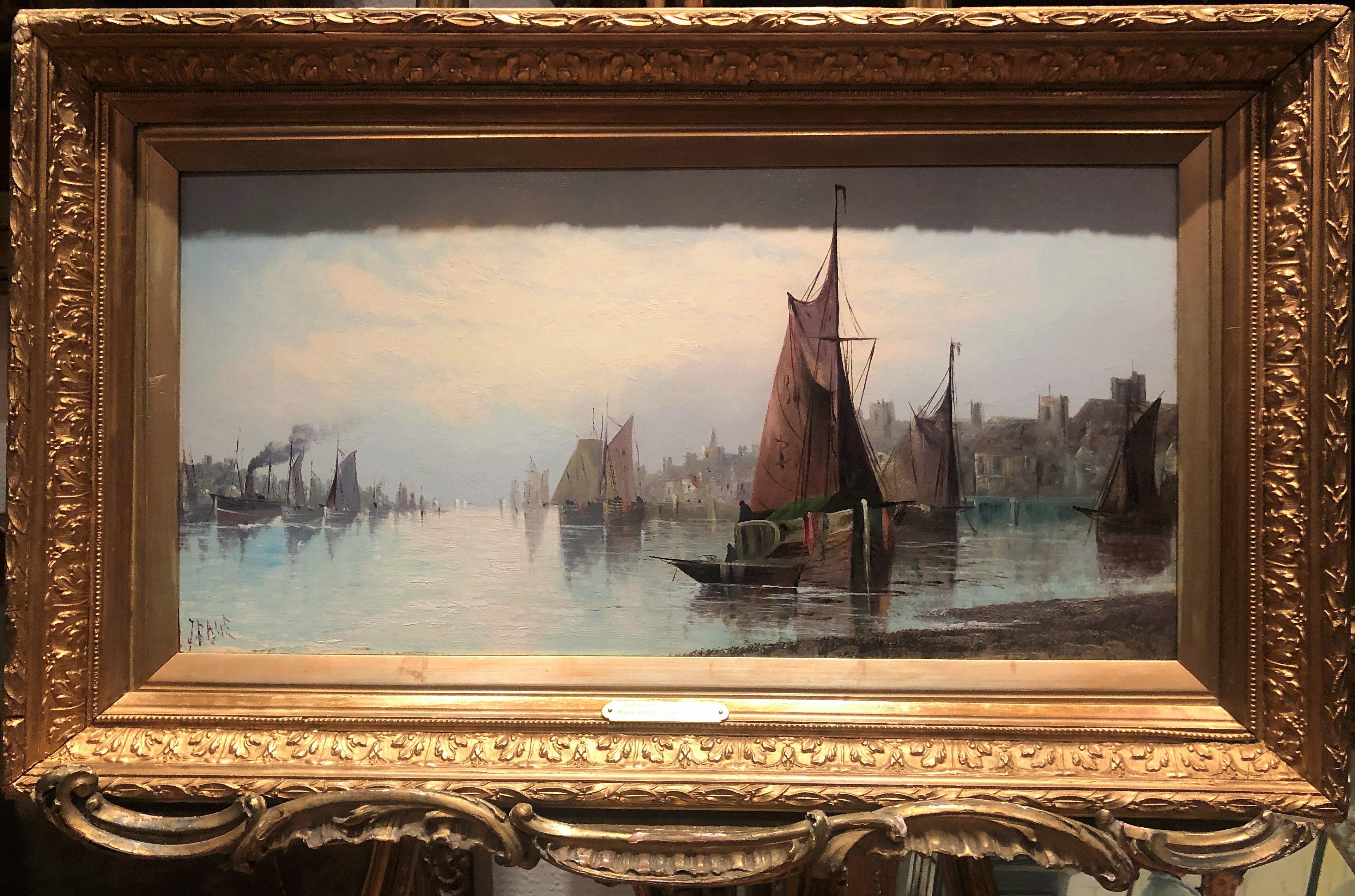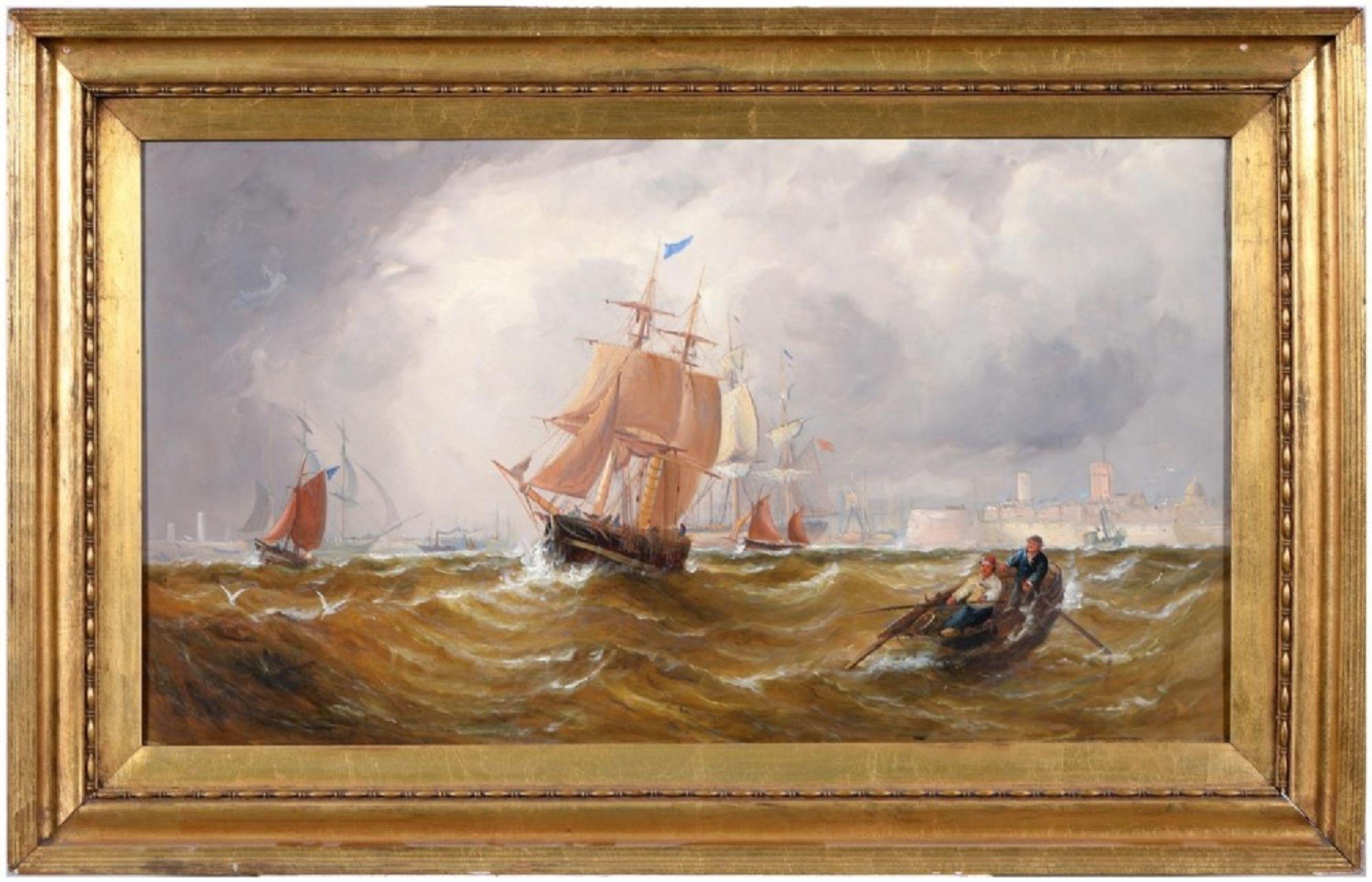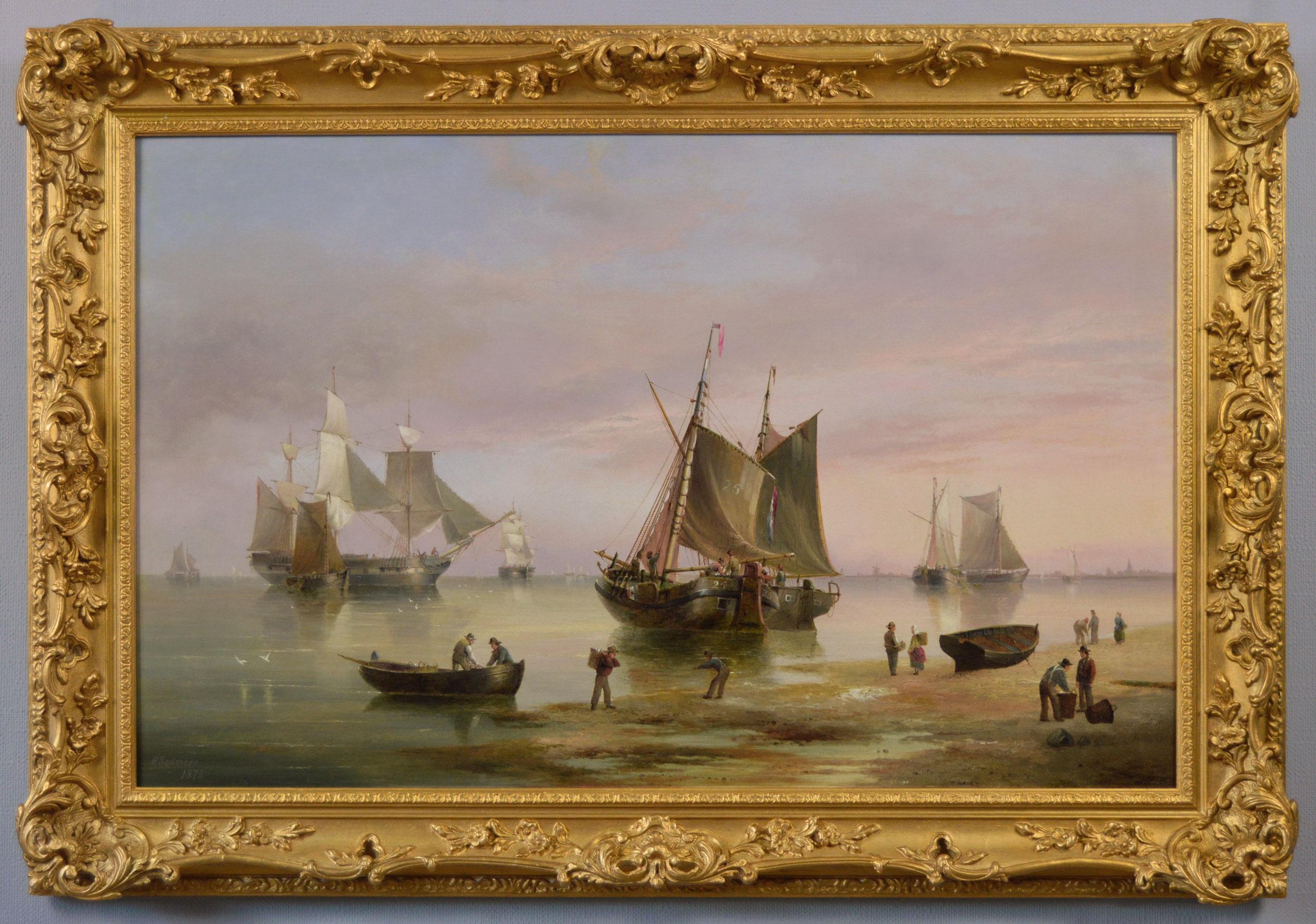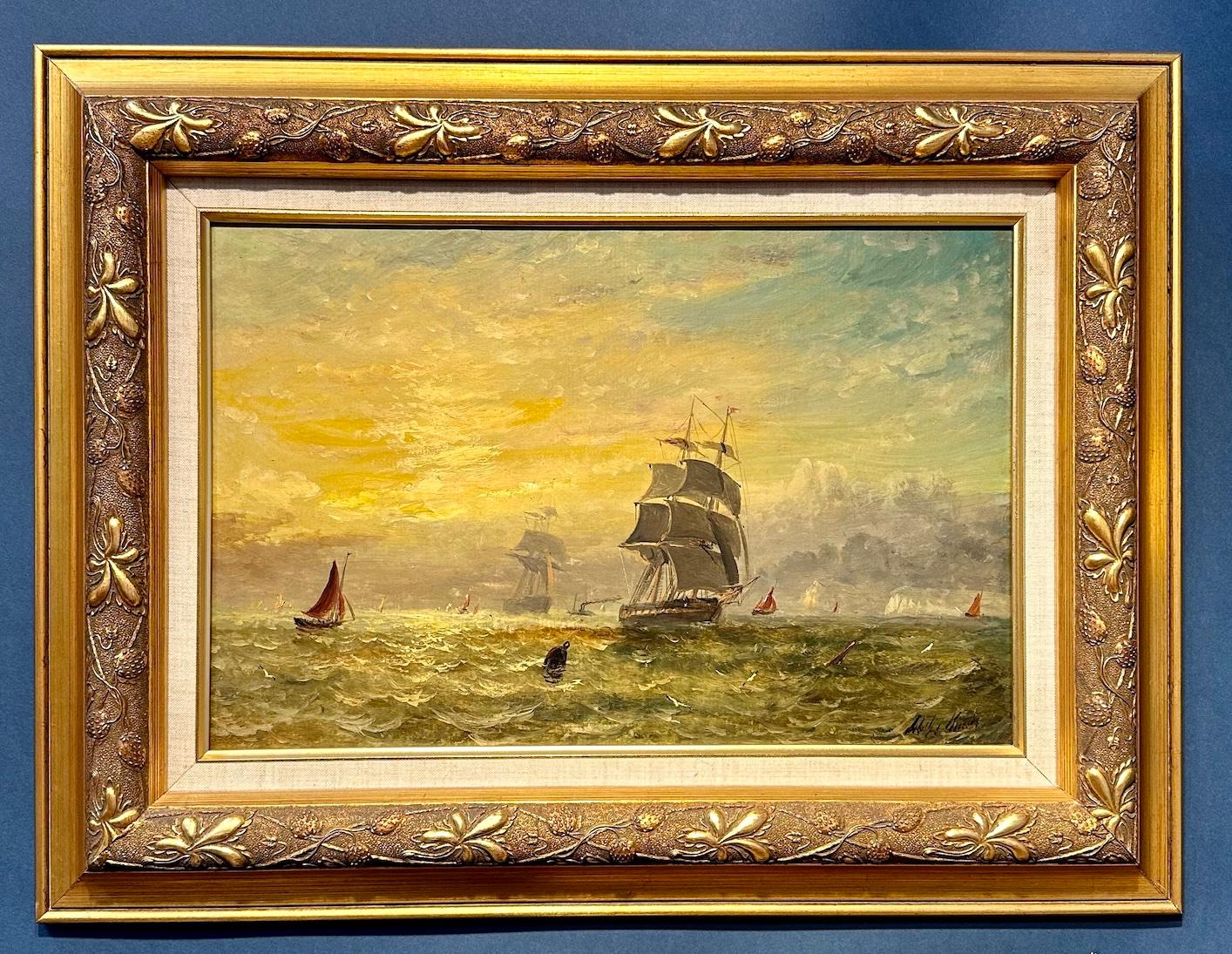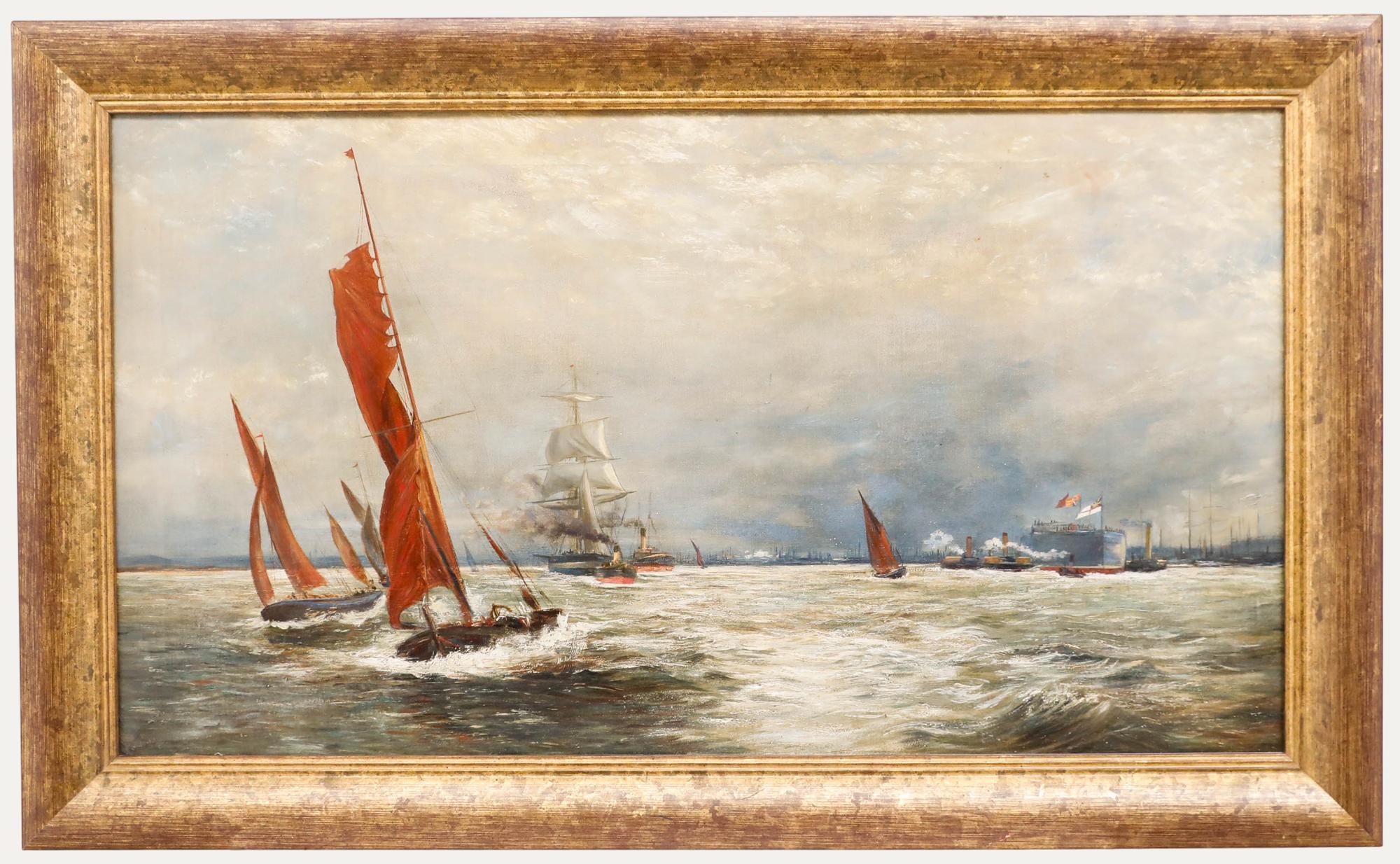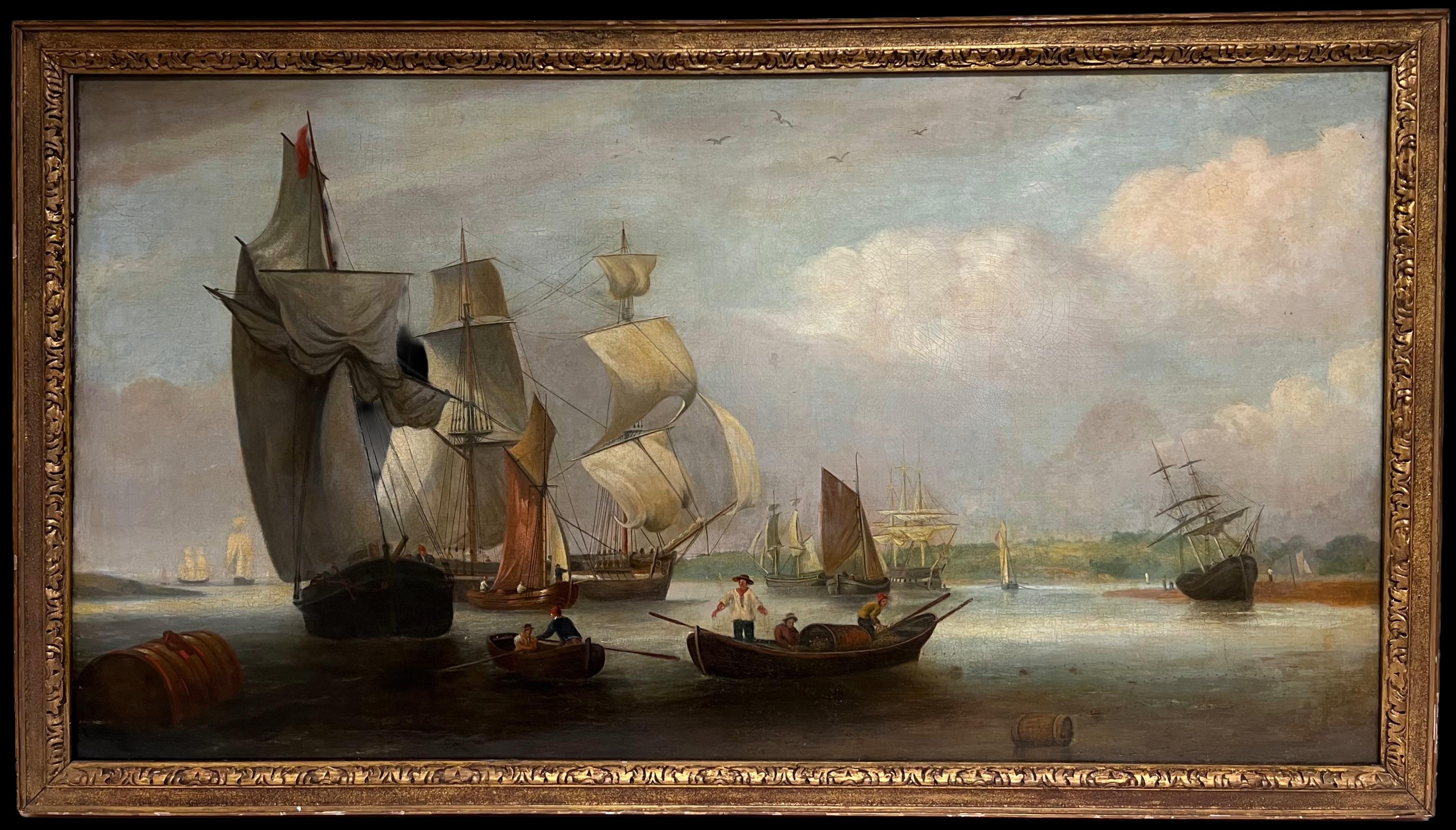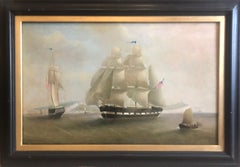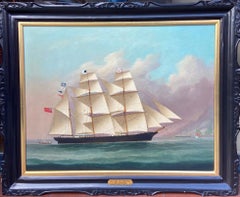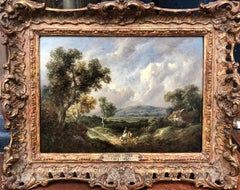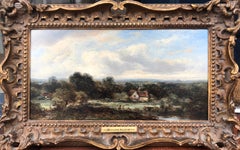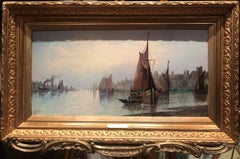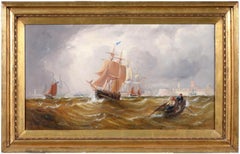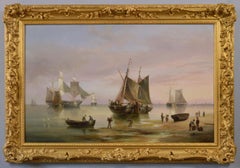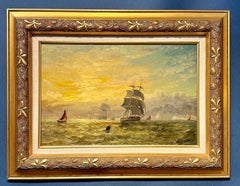Items Similar to Grand 19th Century English Marine Painting in Stunning Light
Want more images or videos?
Request additional images or videos from the seller
1 of 9
John Wilson EwbankGrand 19th Century English Marine Painting in Stunning Light1823
1823
$200,314.76
£146,000
€172,307.35
CA$277,600.20
A$309,470.88
CHF 161,401.81
MX$3,742,220.20
NOK 2,028,899.64
SEK 1,919,744.52
DKK 1,286,098.46
About the Item
John Wilson Ewbank (1799 - 1847)
Shipping in the Harbour, South Shields
Oil on canvas
39.5 x 58 inches unframed
47.75 x 66.5 inches framed
Provenance:
Christie's October 2002; Lot 11.
Fine Art Society;
Private Collection
This marvellous up to scale Ewbank is full of light and warmth and almost certainly his greatest work of the sort rarely - if ever - seen on the market.
John W. Ewbank (4 May 1799–28 November 1847), was an English-born landscape and marine painter largely operational from Scotland.
The Humber river is a large tidal estuary on the east coast of Northern England.
Life
Ewbank was born at Darlington on 4 May 1799, the son of Michael Ewbank, an innkeeper. He was adopted as a child by a wealthy uncle who lived at Wycliffe, on the banks of the River Tees, in the North Riding of Yorkshire. Intended for the Roman Catholic priesthood, he was sent to Ushaw College, from which he absconded.
In 1813 Ewbank was apprenticed to Thomas Coulson, an ornamental painter in Newcastle. In around 1816 he moved with Coulson to Edinburgh, where he had some lessons with Alexander Nasmyth. He found work both as a painter and a teacher. He was nominated in 1830 one of the foundation members of the Royal Scottish Academy.
In 1833 he is listed as living at 7 Union Street on the eastern fringe of the New Town in Edinburgh.
Works
His sketches from nature were especially admired, and a series of 51 drawings of Edinburgh by him were engraved by W. H. Lizars for James Browne's Picturesque Views of Edinburgh (1825). He also made a reputation with cabinet pictures of banks of rivers, coast scenes, and marine subjects.
As an illustrator he illustrated some early editions of Scott's Waverley Novels and one edition of Gilbert White's Natural History of Selborne.
After 1829 he changed style and painted The Visit of George IV to Edinburgh, The Entry of Alexander the Great into Babylon, and Hannibal crossing the Alps
- Creator:John Wilson Ewbank (1779 - 1847, British)
- Creation Year:1823
- Dimensions:Height: 47.75 in (121.29 cm)Width: 66.5 in (168.91 cm)
- More Editions & Sizes:UniquePrice: $200,315
- Medium:
- Movement & Style:
- Period:
- Condition:
- Gallery Location:London, GB
- Reference Number:1stDibs: LU67337797092
About the Seller
5.0
Vetted Professional Seller
Every seller passes strict standards for authenticity and reliability
Established in 1990
1stDibs seller since 2017
42 sales on 1stDibs
Typical response time: A week
- ShippingRetrieving quote...Shipping from: London, United Kingdom
- Return Policy
Authenticity Guarantee
In the unlikely event there’s an issue with an item’s authenticity, contact us within 1 year for a full refund. DetailsMoney-Back Guarantee
If your item is not as described, is damaged in transit, or does not arrive, contact us within 7 days for a full refund. Details24-Hour Cancellation
You have a 24-hour grace period in which to reconsider your purchase, with no questions asked.Vetted Professional Sellers
Our world-class sellers must adhere to strict standards for service and quality, maintaining the integrity of our listings.Price-Match Guarantee
If you find that a seller listed the same item for a lower price elsewhere, we’ll match it.Trusted Global Delivery
Our best-in-class carrier network provides specialized shipping options worldwide, including custom delivery.More From This Seller
View AllA Beautiful and Large Marine - A Ship in Two Positions Off Dover
By William John Huggins
Located in London, GB
William John Huggins (1781-1845)
A Ship in Two Positions Off Dover
oil on canvas
Unsigned
33 x 45 inches, inc. frame
William John Huggins, of wh...
Category
19th Century Old Masters Figurative Paintings
Materials
Oil
19th Century China Trade Painting of Clipper Ship Tin Sing off Hong Kong
Located in London, GB
Anonymous Chinese Painter
Clipper Ship Tin Sing of Hong Kong
Oil on Canvas
25 X 32 inches
Category
19th Century Landscape Paintings
Materials
Oil
Beautiful 19th century Oil on Panel Landscape by Richard Hilder
By Richard H. Hilder
Located in London, GB
Richard Hilder (1813-1852)
Pastoral Landscape
Oil on Panel
8 3/4 X 10 3/4 inches, Framed
Provenance: Important Private Collection
Richard H. Hilder was a landscape painter and occa...
Category
Early 19th Century Landscape Paintings
Materials
Oil
Beautiful 19th century Oil on Panel Landscape by Richard Hilder
By Richard H. Hilder
Located in London, GB
Richard Hilder (1813-1852)
Pastoral Landscape
Oil on Panel
10 X 16 inches, Framed
Provenance: Important Private Collection
Richard H. Hilder was a landscape painter and occasional ...
Category
Early 19th Century Landscape Paintings
Materials
Oil
A Beautiful Pair of Early 19th Century Landscapes
Located in London, GB
Richard Hilder (1813-1852)
Pair of Landscapes
Oil on Panel
9 1/4 X 11 3/4 inches, Framed
Provenance: Important Private Collection
Richard H. Hilder was a landscape painter and oc...
Category
Early 19th Century Landscape Paintings
Materials
Oil
19th Century Landscape Oil Painting - Deer by the Banks of a Lake
By Jacob Thompson
Located in London, GB
Jacob THOMPSON (1806 – 1879)
Deer by the Banks of a Lake
1842
oil on canvas
18.9 x 27.6 inches;
22.5 x 31 inches Inc. frame
Jacob Thompson (1806–1879) was an English landscape-pa...
Category
1840s Old Masters Figurative Paintings
Materials
Oil
You May Also Like
OIL PAINTING By MAJOR John E . Bale OLD FINE MASTER 19th Century BRITISH SCHOOL
By John Edward Bale
Located in Ferndown, GB
OIL PAINTING SIGNED OLD FINE MASTER PAINTER 19th Century BRITISH SCHOOL
Fine Original Antique 19th Century British OLD MASTER
OIL PAINTING
GOLD GILT FRAME
NEW COLLECTION Of RARE PIECES OF ENGLISH HISTORY
By Major John Edward Bale Similar $5,000 Premier Collection
Excellent Condition Panel, Professional Cleaned & re-varnished
Ready to hang.
frame is in wonderful condition .
( note all this would cost £600 alone)
John Edward Bale, was born at Low Farm House, Pattesley-cum-Oxwick,
South Creake, Norfolk on 27 July and baptised at South Creake on
1 August 1834, eldest child of John Edward Bale (1803-27 April 1862),
a farmer of 620 acres, and his wife Mary née Branford,
who married at Horningtoft, Norfolk on 27 November 1833. In 1841,
a 6 year old, living at Low Farm with his parents, 35 year old John and
28 year old Mary, and his two sisters, Mary 3 and Esther 1. In 1861,
a 26 year old 'artist architecture' boarding at 11 Bulstrode Street,
Marylebone, London but in October 1863, he was an Ensign by purchase
in the 1st West Indian Regiment. As a lieutenant, whilst on a tour of
duty in West Africa, Surgeon Major Augustus Frederick Elliott (born 1834),
kept a diary (now at Duke University Library) which is embellished with
calligraphy and watercolour titles by Bale. During this tour, Bale was
promoted to Captain and retired from the army in 1881 with the rank of major.
Bale married at Christ Church, Ealing on 10 November 1868,
Charlotte Gordon Lee née Johnson (c1847-1910).
A painter in oil and watercolour and a member of the Ipswich
Fine Art Club 1886-1890 and as Major Bale exhibited from 9 Creffield Terrace,
Colchester, Essex in 1888, 'View from Museum...
Category
Late 19th Century Realist Landscape Paintings
Materials
Oil
Off Portsmouth Harbour 19th century oil , john callow
By John Callow
Located in York, GB
Off Portsmouth Harbour 19th century oil , john callow
A fine 19th century oil on canvas painting "off Portsmouth harbour "
signed and indistinctly dated 1844, the size of the paint...
Category
1840s Old Masters Landscape Paintings
Materials
Oil
19th Century seascape oil painting of ships on the Humber Estuary
Located in Nr Broadway, Worcestershire
Henry Redmore
British, (1820-1887)
Trading Schooners & Dutch Luggers on the Humber Estuary
Oil on canvas, signed & dated 1873
Image size: 23.5 inches x 37.5 inches
Size including frame: 31.25 inches x 45.25 inches
An atmospheric seascape of fishing boats and ships on the Humber Estuary at sunset. Fishermen can be seen unloading their catch by the shore as others take down their sails and drop anchor.
Henry Redmore was born in Kingston upon Hull, Yorkshire in 1820 to James Redmore and Mary Wilkinson. His father was an engineer and initially Henry followed in his footsteps becoming a marine engineer. His job took him on several voyages as an engineer, which undoubtedly inspired his future career as an artist.
He married Martha Markham on 28 November, 1844 at Hull and together they settled in Sculcoates, a suburb of Hull, They went on to have 4 children...
Category
19th Century Victorian Landscape Paintings
Materials
Canvas, Oil
Antique Victorian, Impressionist 19th century English oil, Fishings boat at Sea
By Adolphus Knell
Located in Woodbury, CT
Antique Victorian, Impressionist 19th century English oil, Fishings boat at Sea.
Adolphus Knell was a superb painter of marine subjects during the middle of the 19th century. His w...
Category
1860s Victorian Figurative Paintings
Materials
Oil, Board
$3,160 Sale Price
20% Off
Free Shipping
Manner of William Lionel Wyllie - 19th Century Oil, Commerce and Sea Power
Located in Corsham, GB
This maritime painting depicts several sailing vessels navigating choppy waters under a dramatic, cloud-filled sky, with a prominent boat featuring distinctive red sails positioned i...
Category
19th Century Landscape Paintings
Materials
Oil
Huge 1800's English Marine Oil Painting Busy Shipping Maritime River Estuary
Located in Cirencester, Gloucestershire
Shipping in the Estuary
Early 19th Century English School
unsigned
oil on canvas, framed
framed: 26 x 46.5 inches
canvas : 24 x 43.5 inches
Provenance: private collection, Surrey, En...
Category
Early 19th Century Old Masters Landscape Paintings
Materials
Oil
More Ways To Browse
Antique Work Light
Catholic Painting
Antique Street Light
Antique Sorter
English Painting Child
Michael English
Wilson Antique
Alexander James
Antique Catholic Art
1825 Paintings
English Riding
Michael Roman
Thomas Alexander
Antique Catholic Painting
Michael Childers
28 Inch Cabinet
Marine Art Scottish
Alexander Shields
